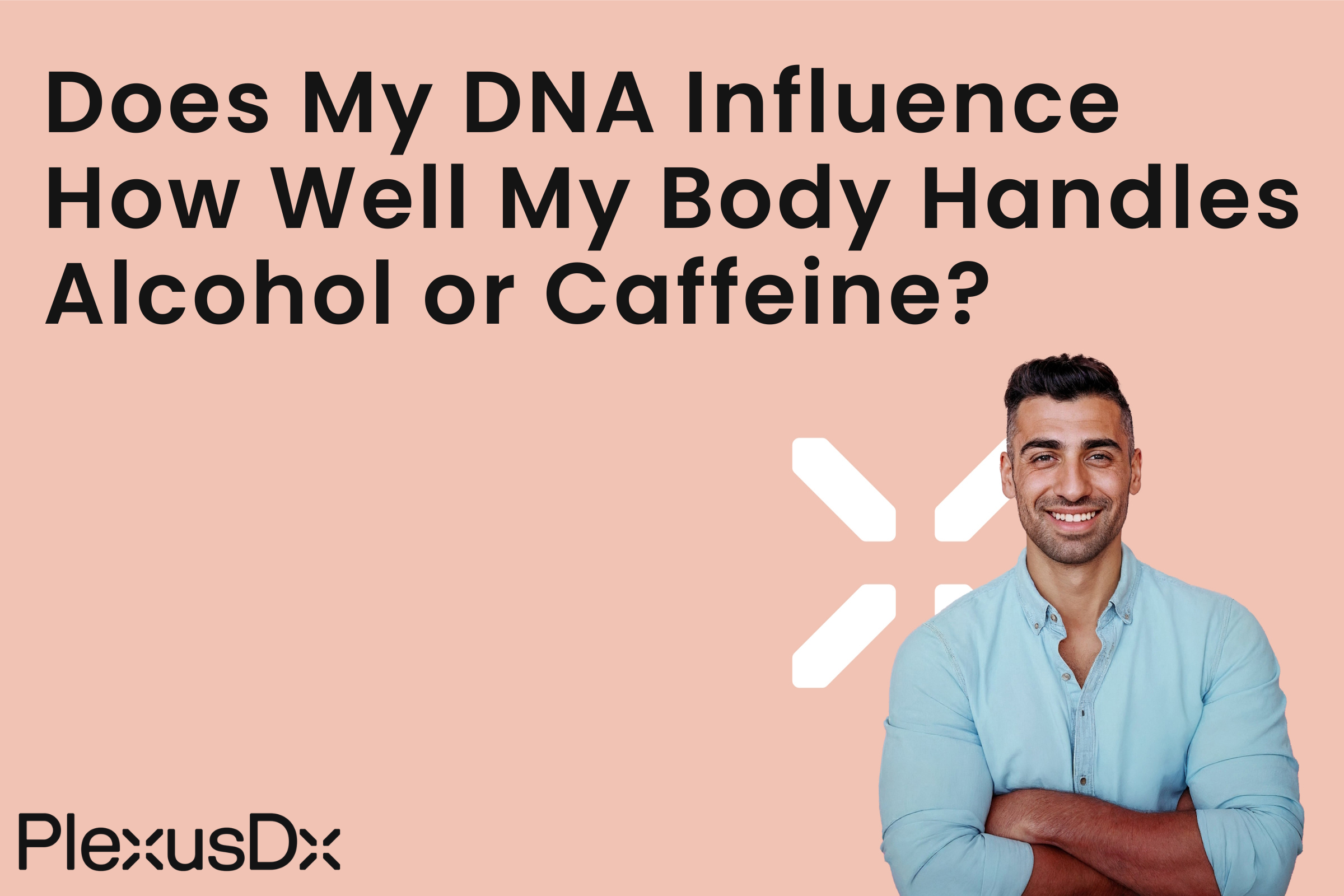What impact does my genetic makeup have on my body's processing of alcohol and caffeine?
Individual sleep patterns differ after consuming coffee before bedtime because while some sleep well others remain awake after just one cup. Some of my friends can drink multiple cocktails without getting hangovers yet I suffer from hangover symptoms after just one drink. The answer may lie in your DNA. The effects of your genetic makeup on how you metabolize alcohol and caffeine inform your decisions about how much you consume. This blog post examines how genetic factors affect alcohol and caffeine processing to help you make better health-focused lifestyle choices.
The Genetic Connection: How DNA Influences Alcohol and Caffeine Metabolism
Your body's genetic makeup controls how effectively it processes substances such as alcohol and caffeine. Different genetic factors determine the rate at which your body metabolizes both alcohol and caffeine compounds. Genetic variations in the ADH1B gene dictate how efficiently your body metabolizes alcohol. Certain people possess genetic differences which enable them to break down alcohol more rapidly thus reducing their chances of developing alcohol-related health issues. A genetic mutation in specific individuals extends their alcohol metabolism time frame which leads to a higher probability of alcohol-related health issues.
People's ability to process caffeine in their bodies depends on their CYP1A2 gene variations. The gene produces an enzyme responsible for breaking down caffeine in the body. People who carry the fast-processing version of this gene metabolize caffeine rapidly enabling them to consume multiple coffee cups without any jittery side effects. People with the slow processing variant of this gene experience increased heart rate and anxiety from even small amounts of caffeine.
A grasp of genetic factors enables you to understand your body's responses to different substances. Individuals who realize their bodies metabolize caffeine slowly should limit their caffeine consumption particularly after dark. Knowing these details enables you to prevent harmful side effects and improve your health.
Personal Anecdotes: Real-Life Experiences with Alcohol and Caffeine
Numerous individuals have described their distinctive reactions when they consume both alcohol and caffeine. Genetic testing results showed that she processes caffeine quickly because she possesses the fast variant of the CYP1A2 gene. The examination of her genetic structure demonstrated why drinking coffee in the morning doesn't make her feel anxious or jittery. His friend altered his caffeine consumption habits upon learning he possessed the slow variant of CYP1A2. Switching to decaf in the afternoon instead of regular coffee eliminated his sleep disruption issues.
Practical situations demonstrate why it is essential to learn about your genetic predispositions. Knowing how your body reacts to certain substances helps you choose lifestyle choices which specifically benefit your health needs.
Practical Advice: How to Use Your Genetic Insights
Knowledge of how your DNA affects your body's responses to alcohol and caffeine helps you make informed decisions based on practical tips.
-
Consider Genetic Testing
Through genetic testing you can learn essential details about how your body metabolizes alcohol and caffeine. Through genetic data analysis PlexusDx generates personalized health reports that help you learn about your unique genomic characteristics. When you use genetic data you can make smarter food selections that result in improved health results. -
Monitor Your Intake
Observe how your body reacts to varying levels of alcohol and caffeine consumption. Pay attention to your body’s signals. Modify your beverage consumption if you feel anxious after drinking a single cup of coffee or experience hangover symptoms from just two drinks. -
Choose Wisely
Choose alcoholic beverages with minimal congener content since these fermentation byproducts lead to hangovers. Congener levels which contribute to hangovers are lower in gins and vodkas than in whiskey and rum. To receive an energy lift without jittery effects choose green tea or herbal teas as caffeine alternatives. -
Stay Hydrated
The body experiences dehydration when you drink alcohol and consume caffeine. Maintain hydration by drinking water when consuming beverages other than alcohol. This essential routine eliminates many of the harmful impacts caused by alcohol and caffeine consumption. -
Consult with a Healthcare Provider
Before making major changes to your diet or lifestyle based on genetic test results consult with a healthcare professional for proper medical advice. Your healthcare provider will assist you in decoding your genetic test results while giving you tailored health recommendations according to your individual needs.
Conclusion
Recognizing genetic effects on your body's reaction to alcohol and caffeine provides you with knowledge to make better health choices. Genetic testing results enable you to modify your food intake patterns according to your biological characteristics through dietary intake tracking. Understanding your genetic predispositions empowers you to establish a balanced lifestyle that brings you enjoyment.
Discover your genetic makeup with PlexusDx Precision Health & Wellness tests. The body's processing of alcohol and caffeine can be understood through testing available from PlexusDx.com as well as Amazon and Walmart which helps you make informed health choices. Harness the power of your genetic information to guide your health management starting now.
Where to Buy PlexusDx Genetic Tests
Ready to take control of your health with precision genetic insights? You can purchase the PlexusDx Food Sensitivity and Allergy Genetic Test from these trusted retailers:
- 👉 PlexusDx – Order directly from our official website.
- 👉 Amazon – Convenient shopping with fast shipping.
- 👉 Walmart – Buy online from a trusted retailer.
Get your personalized DNA insights today and start optimizing your health! 🚀

Share:
Are There Specific Genes That Protect Against Memory Loss?
Does My DNA Determine How My Body Processes Sugar and Insulin?